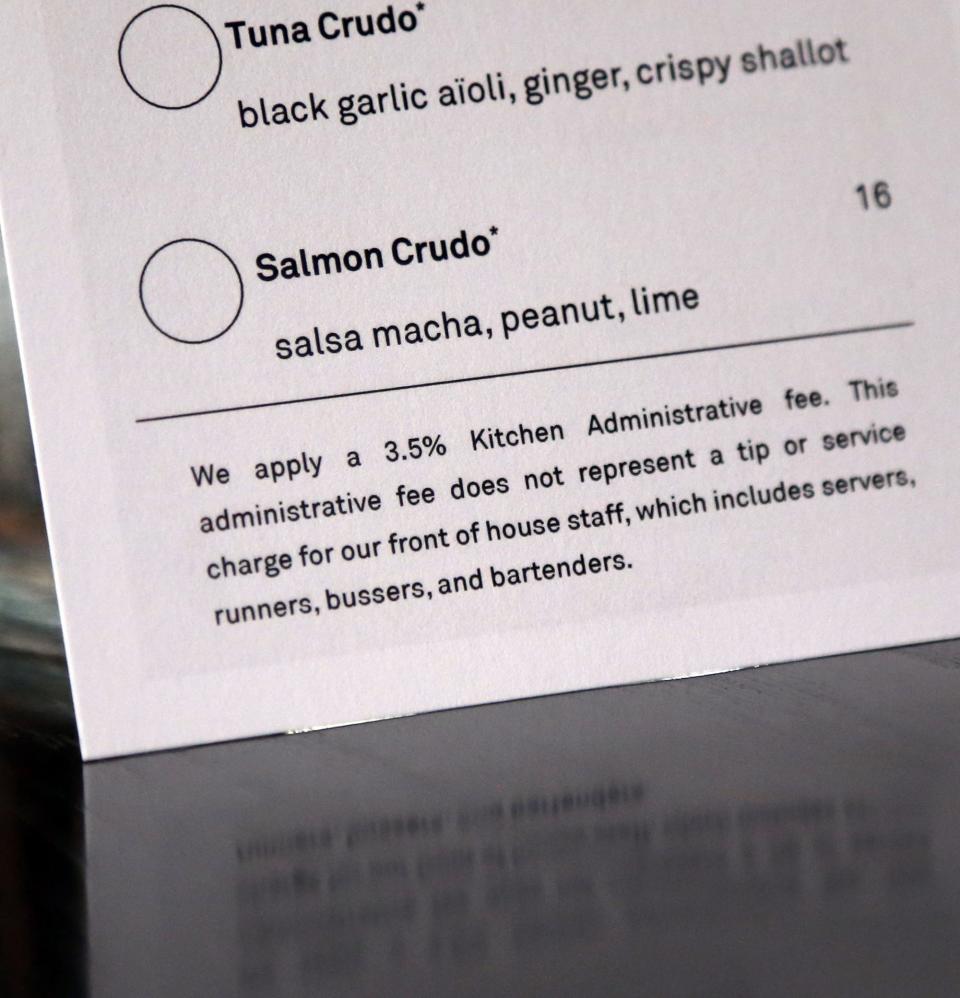Row 34 restaurant in Portsmouth gets creative to raise pay of kitchen staff
PORTSMOUTH — Seafood restaurant Row 34, located in Portwalk Place with sister locations in Boston and Burlington, Massachusetts, tacked an optional “kitchen administrative fee” on all restaurant bills last fall.
The fee is 3.5% of the whole bill given directly to back of house employees, such as line and prep cooks and dishwashers, though patrons can opt in or out of paying the fee.
Row 34 managing partner Shore Gregory said the fee typically equates to an additional $3 more per back of house employee per hour.
“It’s a little bit complicated, but basically the gratuity laws in New Hampshire are such that any gratuity can’t be shared with any employee that doesn’t face the guest,” he said. “So, the service fee isn’t gratuity, and that allows us to share it with our back of house team. It’s had a really meaningful impact.”

New Hampshire's hourly minimum wage for employees is $7.25, which matches the federal minimum wage and is the lowest among the New England states.
Minimum hourly wages for tipped employees of restaurants, hotels, motels, inns or cabins who receive more than $30 a month in customer tips start at 45% of the state hourly minimum wage, according to the state’s Department of Labor. Under those parameters, restaurant servers in New Hampshire begin at $3.27 in minimum hourly wages during their shifts, a total usually surpassed by employers and later boosted with customer tips.
Per state restaurant industry reviews left on Indeed, an online job search engine, the average base salary for servers in New Hampshire is $19.68 before tips.
Back of house restaurant employees in New Hampshire, however, do not receive gratuity, so Row 34’s kitchen administrative fee essentially aims to close the hourly pay gap.
“A lot of it ties back to the (inequality) that exists between pay that front of house employees are able to make as gratuity versus back of house team members who aren’t eligible to receive gratuity,” Gregory said. “There’s a broader conversation around the tipping model for restaurants in general and I think that this has been an elegant way to get more money in the hands of our back of house team.”
When customers dine at Row 34, the kitchen administrative fee is advertised on all menus. Though questions occasionally arise from patrons curious about the fee, Gregory explained that people almost always pay the fee without a fuss.
“The kitchen administrative fee is just another piece of the puzzle to the overall package that we try and put forth for our teams to give them a great quality of life,” he said.
Row 34, which was founded in Boston in 2013 and expanded to Portsmouth in 2015, is not the inaugural eatery to launch a charge for its non-tipped staffers. Gregory noted that the trend is more common than not in Boston restaurants and dates back five or six years, long before the pandemic and its cost-related impacts and labor and inflation.
Chamber Collaborative of Greater Portsmouth president Ben VanCamp said the practice is commonplace in cities and that a few local restaurateurs have considered adding similar fees.
“In today’s tough employment market, employers are finding creative solutions to support their staff and maintain their profitability,” VanCamp said. “In one way or another the increased labor costs are being passed along to the consumer, this model allows for more transparency.”

In an interview this week, New Hampshire Lodging and Restaurant Association president and chief executive officer Mike Somers pondered whether Row 34 could have achieved the same effect by raising menu item prices.
The question has been a “hotly debated topic” by industry operators around the state, Somers said, as businesses adjust their practices to accommodate cost of labor and inflation.
“I think there’s a hesitation on the part of a lot of businesses to go down this road,” he said of Row 34’s approach, “simply because they’re worried about how many other fees and surcharges they’ll have to tack on to make it work.”
Somers said that in the past, restaurants increased menu prices once a year on average, though in today’s climate many are doing two or more times per year.
Gregory countered that line of thought by arguing that if the business raised menu prices to pay its workers more, it may turn off possible patrons from dining at Row 34.
“I think that it’s not necessarily a one-to-one trade,” he said. “Some people get a little bit scared off by more expensive menu items versus paying the kitchen administrative fee.”
Continuing to navigate COVID-19 and its various impacts, Somers said he anticipates different strategies like Row 34’s being considered over the next few years by restaurants in New Hampshire and beyond.
“I think the broader debate is, should you have a surcharge for a specific thing, or should it be built in as part of the menu pricing?” he said.
Craig Lee is the chef de cuisine at Row 34’s Port City location, overseeing a team of about 12 back of house employees. A six-year employee of the restaurant, Lee said the kitchen administrative fee has eased the burden some employees have about living paycheck to paycheck.

The hourly increase from the fee allows employees to more easily pay their rent, student loans, gas prices and other costs of living, he said.
“They love it,” Lee said. “Even people that will come in for interviews, you explain that it’s part of their pay and they’re like, ‘Oh, that’s awesome.’ It gives us a competitive advantage, too.”
Row 34, which is opening a fourth location this fall in Cambridge, Massachusetts, also implemented the kitchen administrative fee at its Boston and Burlington restaurants last fall.
This article originally appeared on Portsmouth Herald: NH restaurant adds optional fee to bill to raise kitchen staff pay

